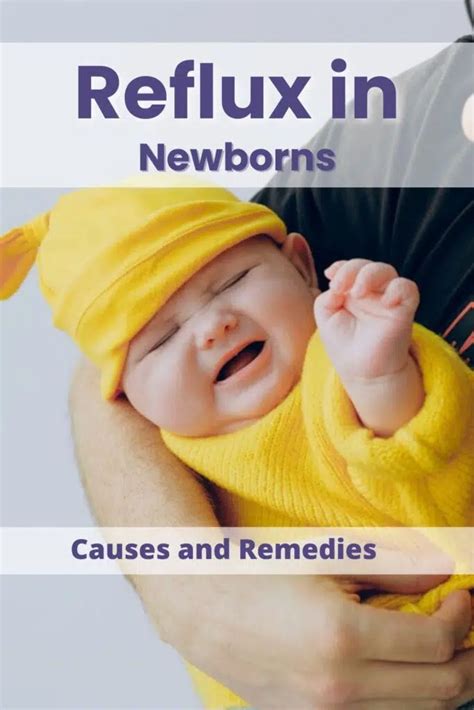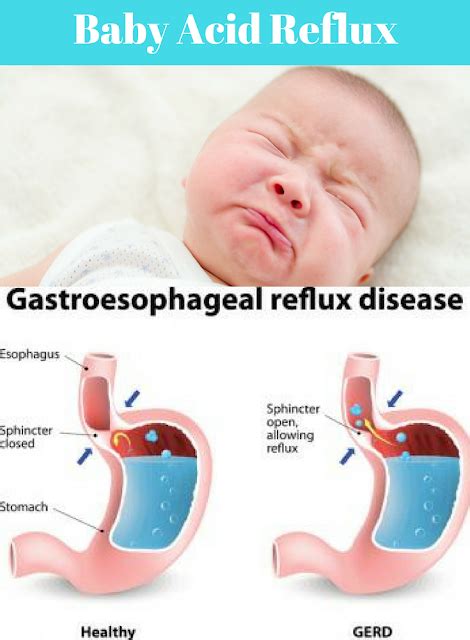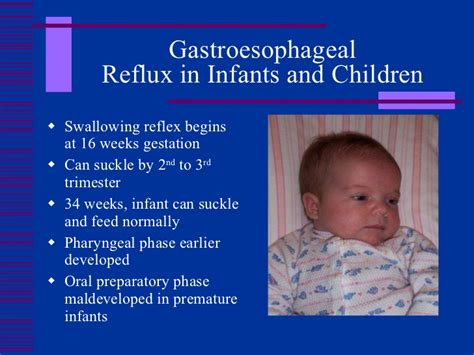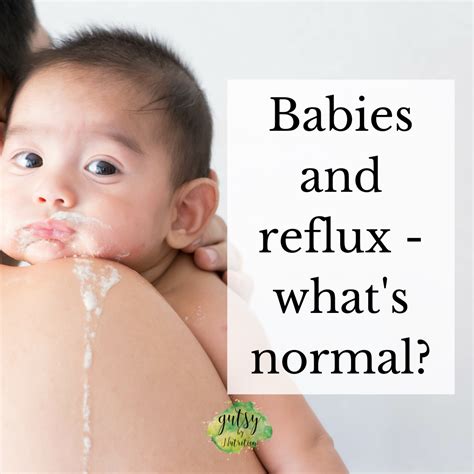Intro
Identify reflux in newborns symptoms, including spitting up, fussiness, and feeding issues, and learn about diagnosis, treatment, and management of infant acid reflux and gastroesophageal reflux disease (GERD) in babies.
Reflux in newborns is a common condition that can cause discomfort and concern for parents. It is essential to understand the symptoms, causes, and treatment options to provide the best possible care for your baby. Reflux, also known as gastroesophageal reflux (GER), occurs when stomach acid flows back up into the esophagus, causing irritation and discomfort. In newborns, this condition is often due to an immature digestive system and can be exacerbated by factors such as feeding position, diet, and overall health.
Reflux in newborns can be challenging to diagnose, as the symptoms can be subtle and may resemble other conditions. However, being aware of the common signs and symptoms can help you identify reflux in your baby and seek medical attention if necessary. Some common symptoms of reflux in newborns include spitting up or vomiting after feedings, coughing, gagging, or choking during or after feedings, and refusing to feed or showing signs of discomfort during feedings. Additionally, babies with reflux may arch their backs, stretch, or seem uncomfortable after eating, and may experience gas, bloating, or abdominal pain.
The importance of recognizing reflux symptoms in newborns cannot be overstated. If left untreated, reflux can lead to complications such as poor weight gain, respiratory problems, and increased risk of Sudden Infant Death Syndrome (SIDS). Furthermore, reflux can cause significant discomfort and distress for babies, affecting their overall quality of life and development. By understanding the symptoms and seeking medical attention if necessary, parents can help their babies receive the proper treatment and care to manage reflux and prevent long-term complications.
Understanding Reflux in Newborns

Symptoms of Reflux in Newborns
The symptoms of reflux in newborns can vary in severity and frequency. Some common signs and symptoms include: * Spitting up or vomiting after feedings * Coughing, gagging, or choking during or after feedings * Refusing to feed or showing signs of discomfort during feedings * Arching their backs, stretching, or seeming uncomfortable after eating * Experiencing gas, bloating, or abdominal pain * Having trouble sleeping or being irritable due to discomfortCauses of Reflux in Newborns

Treatment Options for Reflux in Newborns
Treatment options for reflux in newborns depend on the severity of the condition and the individual needs of the baby. Some common treatment options include: * Lifestyle changes, such as feeding in an upright position, burping frequently, and avoiding overfeeding * Medications, such as antacids or acid reducers, to help reduce stomach acid and alleviate symptoms * Dietary changes, such as thickening breast milk or formula with rice cereal, to help reduce reflux * Surgery, in severe cases where reflux is causing significant complications or discomfortDiagnosing Reflux in Newborns

Complications of Reflux in Newborns
If left untreated, reflux in newborns can lead to complications such as: * Poor weight gain * Respiratory problems, such as asthma or pneumonia * Increased risk of Sudden Infant Death Syndrome (SIDS) * Esophagitis, or inflammation of the esophagus * Stricture, or narrowing of the esophagusManaging Reflux in Newborns

Preventing Reflux in Newborns
While it may not be possible to completely prevent reflux in newborns, there are steps that parents can take to reduce the risk of reflux. Some tips for preventing reflux in newborns include: * Breastfeeding, which can help reduce the risk of reflux * Avoiding overfeeding, which can exacerbate reflux * Feeding in an upright position to reduce reflux * Burping frequently to release trapped air * Avoiding triggers, such as citrus fruits or tomatoes, that can worsen refluxConclusion and Next Steps

We invite you to share your thoughts and experiences with reflux in newborns in the comments below. Have you or someone you know dealt with reflux in a newborn? What strategies or treatments were most effective in managing symptoms? By sharing your stories and insights, you can help other parents navigate this challenging condition and provide the best possible care for their babies.
What are the common symptoms of reflux in newborns?
+Common symptoms of reflux in newborns include spitting up or vomiting after feedings, coughing, gagging, or choking during or after feedings, and refusing to feed or showing signs of discomfort during feedings.
How is reflux in newborns diagnosed?
+Reflux in newborns is typically diagnosed based on a combination of physical examination, medical history, and diagnostic tests, such as upper GI series, endoscopy, or pH probe.
What are the treatment options for reflux in newborns?
+Treatment options for reflux in newborns depend on the severity of the condition and may include lifestyle changes, medications, dietary modifications, or surgery in severe cases.
Can reflux in newborns be prevented?
+While it may not be possible to completely prevent reflux in newborns, there are steps that parents can take to reduce the risk of reflux, such as breastfeeding, avoiding overfeeding, and feeding in an upright position.
What are the potential complications of reflux in newborns?
+Potential complications of reflux in newborns include poor weight gain, respiratory problems, increased risk of Sudden Infant Death Syndrome (SIDS), esophagitis, and stricture.
